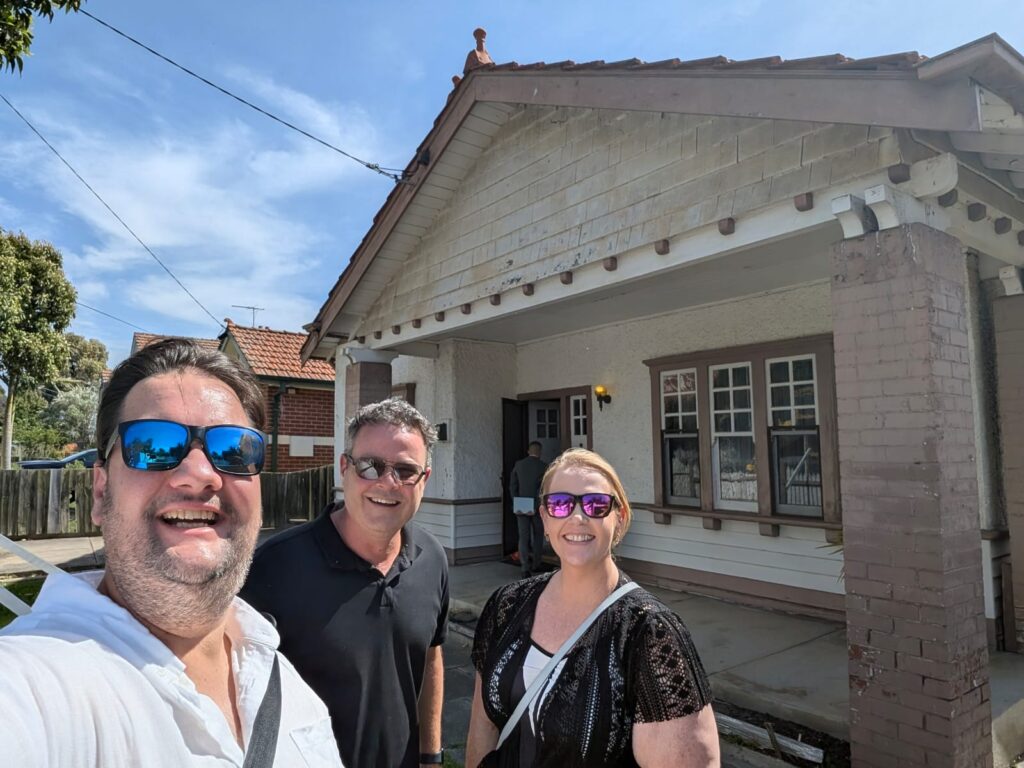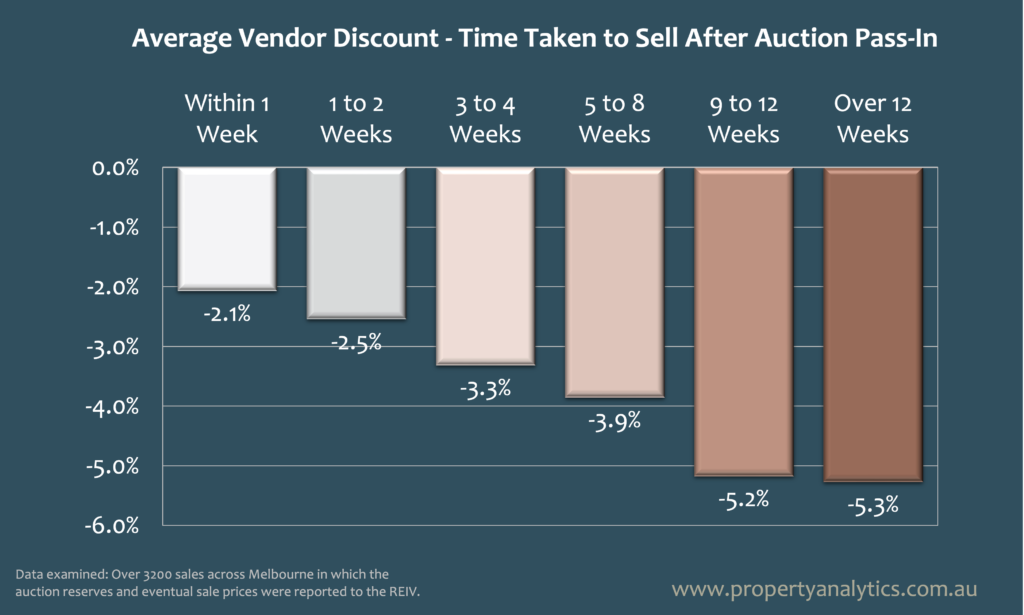
I bought a property for a client the other weekend with a simple but effective auction strategy: Quietly study the competition until bidding hits the reserve, wait for things to slow down a bit, and then bid hard.
Every property, campaign, and auction is different, so this isn't a one-size fits all approach (i.e., I use different strategies depending on the circumstances). But I reckon the following advice is useful for professionals and non-professionals alike.
In the points below, I'll delve further into this approach as well as a few alternatives, so you have access to 10 simple bidding strategies that you can use at your next auction.
I'll also provide a real-life case study to demonstrate how many of these strategies can work together to help me (and you) confidently and effectively buy a house at auction.
I've been working as a property investment advisor and buyers advocate in Melbourne for years, and if there's one thing I know for sure, it's that all auctions are designed to benefit sellers.
Firstly, it's the vendor who is calling the shots. Going into an auction, nobody knows what price the vendor wants – even the selling agent sometimes! The unknown keeps everyone interested and on edge.
Secondly, most auctions are conducted in public, in front of a large crowd. The vast majority of people attending aren't there to bid; they're simply looking to enjoy a show. But serious buyers see everyone as potential opposition, and their competitive instincts go up.
I could go into 5 more reasons why property auctions favour sellers, but really, it comes down to two simple facts. Auctions are all about emotion, and buyers don't want to miss out!
So, here's what happens. Emotional and inexperienced buyers compete with each other, and many bid much higher than they originally intended. What is another thousand dollars? Five thousand? Ten thousand?! The motive can often evolve into beating the other guy instead of securing the property.
So, how do you break this cycle and secure your investment property for a good price?

One key thing to understand as a buyer is what happens if the bidding doesn't reach the reserve price. Generally, the vendor will be forced to negotiate in a more rational environment. This involves the seller and agent putting their cards on the table and ultimately saying "We want $X for the property". Their proverbial pants get pulled down, ideally without a single bid being placed.
Auctioneers make a big deal of affording the highest bidder the first opportunity to negotiate with the vendor if the property passes in, and this can be a risk for those who don't have that last bid.
A good way to alleviate this risk is to tell the real estate agent prior to the auction that you are seriously interested in purchasing the property. If it passes in, and negotiations with the highest under-bidder commence, the agent will advise the vendor that they know of another interested party who may be willing to pay more.
By making your intentions clear, you do two things. You increase the likelihood that the vendor will not settle because they know there's another party who may be willing to pay more. And you keep yourself in the race when the property is passed in, even if you're not the highest bidder.
[It's worth noting from the beginning that Passed In properties can be really good buys. The longer properties languish on the market after being Passed In At Auction, the heavier the eventual discount. Negotiating After Auction is an article for another day though!]

There are a few schools of thought on exactly when you should bid, and we'll explore some of them in the points below. But this strategy pairs perfectly with our first point, so this is where we'll start.
When a property is "on the market", it has reached the vendor's reserve price and the house will sell when the hammer falls.
The auctioneer does not need to tell you when the property is on the market, but you are definitely entitled to ask and ask, and ask again.
When you know the property is on the market, you can bid with conviction. You will know exactly how close you are to your budget, and you will understand you're playing for keeps.
Once a property goes "on the market" the highest bidder will secure it under the hammer, there is no room for negotiation after. Sometimes you may jump in with a bid immediately, other times you may wait a bit for other bidders to drop off. Try to assess whether there are other bidders waiting and what will give you the best psychological edge.
Bidding only when the property is on the market is one way you can set your own pace during an auction. The auctioneer will be looking to you as a serious bidder because you’ve already told them as much. Holding back until you have all the facts lets you understand your competition and bid your way.
Another way to set the pace during an auction is to know your bid increments and make bids quickly, authoritatively, and consistently.
I've seen an auction go up over $100,000 on $1,000 bids alone. An emotional, non-professional bidder can get consumed with the thought of not losing out on a property for a measly $1,000. Never mind the $90,000 over budget he's already gone!
By maintaining set increments when other potential buyers start to wane, you give the impression that you're capable of bidding much higher, and even the illusion of deep pockets can be powerful.
This approach prevents you from getting caught up in a back-and-forth mirror match with other bidders, and it doesn't allow the auctioneer to dictate your bid increments. There may be times when auctioneers don't accept your bid ("Sorry sir, I'm only accepting $10,000 increments"), but they will always come back to you and accept your bid when it comes to crunch time.
This strategy isn't about making that "knockout bid" or befuddling others with odd increments. It's about consistent, confident bidding and the power that can offer you.
You can see how these three strategies work together. Telling the agent that you're a serious bidder means they know your intentions even before you start bidding. Once you know the property is on the market, you can start bidding, letting you set the pace. Bidding only when the property is on the market also reinforces your intent with the auctioneer and other bidders.
Now that you've started bidding, you can bid confidently and consistently, knowing that the property is going to sell and further increasing your edge over other bidders as they begin to wane.
And if the property never reaches its reserve and passes in, the agent recognises you as a genuine buyer. Yes, you run the risk of missing out while the vendor negotiates with the highest bidder, but the agent knows about you and will tell their client about another serious party. With this information in mind, the seller is less likely to strike a deal, and they will most likely come back to you later in the afternoon or early Monday.
Now let's look at a few more solid bidding strategies.
Whether you're teaming up with a buyers advocate in Fitzroy or you're bidding for yourself, you must understand your budget as part of your bidding strategy.
Your budget shouldn't just be one number, but a few numbers:
I've already told you that it's often best to withhold your bid until the property is on the market, and I stand by that. But if you want to employ the strategy of the opening bid, here's when you might want to do it (and how).
When you get to the auction, try and size up your competition and figure out how many genuine bidders there appear to be. If there are more than half a dozen, you're either looking at a hot property or a large swathe of bidders who have been duped into thinking the property will sell for far less. Or it could be a combination of both.
Making a comically low bid is pointless and the reaction could hurt your credibility. Making a bid that's too high could see you paying overs if you've misjudged the competition.
But making a strong opening bid in these circumstances could have just the right effect. You show serious bidders that you're in the hunt and you immediately knock out those early bidders who were never really in the running.
I've been to auctions where early and mid-auction bidders have driven up the price only to find themselves out of the race long before the hammer falls. A swift and decisive opening bid can wipe these filler bids off the final price and put you in a stronger position.
A big opening bid can also take the air out of the auction, which shifts the power away from the auctioneer and the vendor and firmly in your direction.
Of course, knowing just how much to bid comes down to diligent property market research, an understanding of interest in the property, and an insight into the expectations that the vendor's agent has set.
Getting to the auction early lets you select your bidding position. It's a small part of your strategy, but it can play an important role. You want to select a spot where you have a good view of the crowd, and you can monitor your competition for signs of distress, hesitation, or resignation.
If you're the first to arrive, you can also scope out the different groups and estimate exactly how many active bidders you might be up against. Many people just come to auctions to observe, but if they're greeting the agent like old friends or they appear to be a professional buyers agent, this is a sign of serious competition.
You don't want to be the one at the auction who is constantly hesitating. You don't want to find yourself on the phone every five minutes, and you don't want to be looking at your partner or an agent and having a conversation in between every bid.
Little tells like this can stall your rhythm, embolden your competition, and ultimately be self-defeating. Conversely, if you see these signs in your competition, you might be in a good position.
So, make sure that you're confident and authoritative and watch for other bidders who may be off their game. Alternatively, if you're hoping that the property will pass in (ideally with no bidding at all) then it can be helpful for you to look disinterested so that other parties don't consider you as competition.
The auctioneer and sales agents will likely be in full control of their body language. Be aware that their actions are likely a deliberate ploy to manufacture urgency and don't get drawn into their games. Most good auctioneers will deploy the "going once, twice.." routine several times throughout an auction in order to stimulate action. Hold your nerve.
A slow auction or a complete non-starter is a sales agent’s worst nightmare. As a buyer in this position, it's worth remembering that vendors will often lower their expectations, and their price, mid-auction.
It's up to you to take advantage of the unique dynamics of a slow auction.
If you're serious about buying a property, you hire a lawyer to handle the conveyancing and a building inspector to check for serious structural issues.
So many people believe they are on their own when it comes to bidding, but they're not. Because auctions are designed to drive up emotional bidding, it's important to do all you can to detach yourself from the process. I've bid at a lot of auctions, but even I had someone bid on my behalf for my family home - I didn't want to be the emotional buyer who stretched beyond his limits.
If you don't have the time, you don't have the confidence, or you just want the best chance at success, you can hire a buyers agent or buyers advocate to bid on your behalf. Even if you understand a range of different bidding strategies, you might not be able to pull them off yourself in a high-stakes, high-pressure environment.
Buyers advocates feel like an optional extra for so many people, but we leave many other matters in the hands of professionals, and very few of those matters are valued at the million-dollar mark.
You might say that I'm biassed, and maybe I am. As a buyers advocate serving Kew East, Kew, Northcote, and the wider Melbourne area, I'm always going to recommend a buyers agent.
But I'm also honest, so I won't always recommend myself. The Property Analytics team specialises in finding and securing investment properties and sites with high potential for residential development. If you're looking for someone to find your dream home, I can help you, but not if you're willing to pay way over market value to secure it. I will be hard headed about where your budget numbers should be.
If you want someone to find and successfully bid on properties that generate the sort of profit that investors dream of, consider hiring Property Analytics as your buyers advocate.
I won't dwell on this point, but it's worth mentioning briefly. For your bidding strategy to be truly effective, you need to have everything else covered before auction day. A buyers agent can assist you with many of these fundamentals, and other professionals can guide you through the rest. Auction purchases are Unconditional, meaning you must have everything in place beforehand.

Now that you know a few more bidding strategies, let's see how they play out in real life. In the study below, I implemented the first three strategies on this list.
I informed the agent of my intentions, waited for the property to hit the market, and bid without reducing my increments.
Here's what happened.
In this particular situation, I knew the selling agent pretty well and was open with him immediately prior to the auction. I told Jack that my buyer wanted to purchase the property, but I wanted it to pass in. He replied that I better be the highest bidder so that I could be the one to negotiate. This wasn't my intention, but I planted the seed in his mind.
The auction started with a vendor bid of $900k, and after a big song and dance, someone finally put in a bid of $920k. It went back and forth slowly between 3 bidders, up to $1.116m, and then it faltered.
The auctioneer pointed to me, saying "Andrew, you're awfully quiet mate?! I'm sure you're interested". Without missing a beat, I replied "Is it on the market yet?"
That little interplay helped me enormously because it told the vendor that I was a serious 4th bidder, interested in getting involved – but only on my own terms.
If the vendor wanted the auction to continue, he had to put it on the market. If he didn't put it on the market now, then it would most likely pass in, and the leverage would swing towards me and the other buyers during post-auction negotiations.
After another song and dance, Jack conferred with his vendor inside and came out excitedly exclaiming that the property was on the market at $1.116m (clearly a bit lower than the vendor wanted, but it was in his interest to take advantage of the emotional environment and keep the auction going).
I went straight in at $1.120m. Bidder #2 went $1.121m, but I bid straight back at $1.125m and knocked him out of the bidding.
Going once, going twice… then bidder #3 came in at $1.126m. Me at $1.130m. Him at $1.131m. Me at $1.135m. Him at $1.136m. Me at a winning $1.140m – we secured the property under the hammer, for $10k below budget!

If you are preparing for an upcoming auction – I wish you the best of luck! I hope the tips, strategies, and real-world experience outlined in this article give you the confidence and direction you need to win the day.
If you are looking for buyers advocates in Brunswick and Melbourne-wide for investment properties and residential property development, talk to Property Analytics.
My name is Andrew Stone, and my team and I offer end-to-end buying services, from shortlisting properties to feasibility studies to negotiating the best price at auction, private sale, or off-market negotiations.
Our property buying process is data-driven and specific to you. To save big money on auction day and generate real wealth through real estate investing, get in touch today for a chat.
Buying property is expensive, complicated, and risky, especially when it comes to bidding at auction. However, it can all be made a little easier with the help of our highly knowledgeable buyers advocates in Melbourne.
A good buyer’s agent can simplify the purchase process, help you to access more properties, and ultimately, save you big money. At Property Analytics, we don’t sell properties–we only represent property buyers and work in their best interests.
From property auction tips to implementing the right real estate auction strategies, we can help you to make smart decisions that benefit you in the long run.